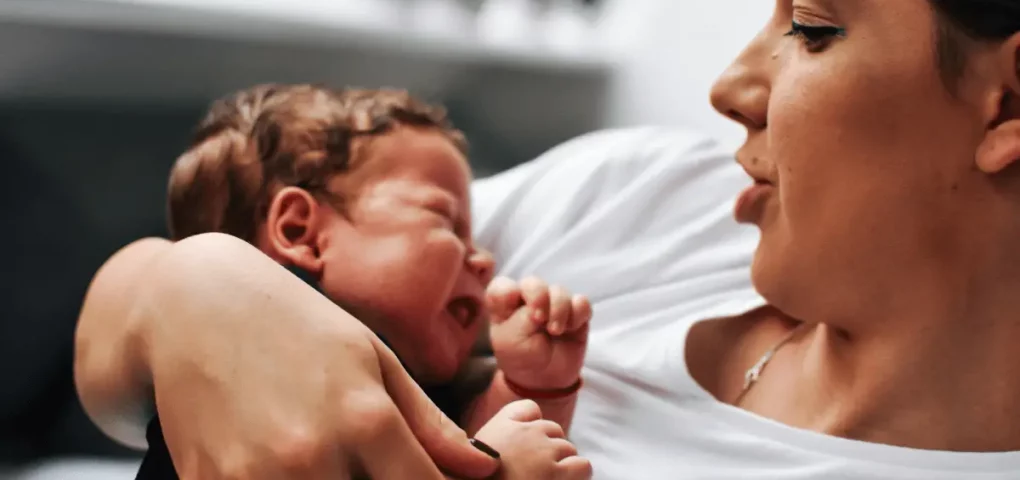
Do you want to know how to make a baby pass gas? It’s not as difficult as you might think! In this blog post, we will discuss the different methods that you can use to get your baby to fart. Some of these methods are more reliable than others, but all of them are worth trying!
Keep reading for more information on how to make a baby fart without stressing yourself out.
Why Should You Encourage A Baby To Fart?
Most parents have experienced baby gas at some point. It is often characterized by a loud, sudden noise that can be quite startling (and even a little bit embarrassing). While baby fart may be unpleasant, it is actually a normal and healthy part of development.
When babies eat, they swallow a lot of air. This air becomes trapped in their digestive system and eventually needs to be released as a baby fart. For some babies, this happens through burping; for others, it occurs through farting.
Not being able to fart will make babies cry incessantly. After all, air bubbles need to come out as baby fart. Otherwise, your baby might feel uncomfortable, and sometimes, the feeling can intensify until it becomes painful. Either way, encouraging your baby to fart is an important part of keeping them healthy and comfortable.
When babies are constipated or have trapped gas, they can cry inconsolably, and your baby’s legs might keep kicking, as they may be uncomfortable. Encouraging them to fart can help relieve this discomfort by getting rid of trapped gas.
Gas bubbles can be uncomfortable for babies, so it’s vital to help them release this gas as needed. Let us explore how you can help your baby pass gas or release trapped wind properly.
How Can You Help A Baby Fart?
All babies fart. It’s perfectly normal. If you’ve seen a baby fart challenge, then you know that a baby farting is healthy and normal.
In fact, it’s a sign that your baby’s digestive system is working just as it should. However, some babies seem to fart more than others. If your baby keeps farting, then this should be good news! You can even join the baby fart challenge.
However, there are times when babies cannot fart. If you’re concerned about your baby’s flatulence, you can do a few things to help your little one let off some steam.
First, try not to worry too much about your baby’s own gas.

It’s actually good for them to expel any air bubbles that may have become trapped in their tummy. You can help by gently massaging your baby’s tummy clockwise. This will help break up any air pockets and make it easier for your baby to expel them.
You can also lay your baby on a soft but firm surface and perform a tummy massage. You can also massage your baby’s lower legs to help stimulate the movement of gas through their system. Propping your baby in an upright position will also help as gravity will assist in moving the gas bubbles through their system.
Use a warm compress
If you’re still struggling to get your baby to fart, you can try using a warm compress on their tummy. This can help relax their muscles and make it easier for them to expel any trapped gas.
Give your baby plenty of fluids
If your baby is constipated, this can also lead to an accumulation of gas in their tummy. Try to help your baby stay regular by ensuring they’re getting plenty of fluids and fiber in their diet.
You can also talk to your pediatrician about giving your baby a stool softener if needed. Examples of fluids that can help include water, prune juice, and pear juice.
Try gripe water
Gripe water is a popular remedy for gas and indigestion in babies. It is made with herbs like fennel and ginger, which can help soothe your baby’s tummy. You can give gripe water to your baby after each feeding.
Avoid foods that cause gas buildup
You should also avoid giving your baby foods that are known to cause gas. These include cabbage, broccoli, onions, and beans. Feeding your baby these foods might make their gas worse.
Burp your baby often
Make sure to burp your baby often so that they don’t swallow too much air. Swallowing air can make your baby’s gas worse. Try to burp them after each feeding or whenever you notice they seem gassy.
Exercise caution with over-the-counter medications
There are some over-the-counter medications that claim to help with gas, but you should always talk to your doctor before giving them to your baby. Some of these medications might not be safe for young infants.
Make sure your baby is getting enough tummy time

Tummy time is when you put your baby on their stomach while awake and supervised. This helps to strengthen their muscles and can prevent gas buildup. Make sure to give your baby plenty of tummy time each day.
These methods are all safe and effective ways to help your baby with their gas. If you’re still having trouble, talk to your doctor. They can help you figure out what might be causing the problem and offer additional solutions.
What Is Flatulence?

Flatulence is the release of gas from the stomach through the nose and mouth. It’s also called passing wind or breaking wind. The gas is made up of food, bacteria, and air. When these gases escape, they can sometimes make a noise. This is called farting or passing gas.
Flatulence is normal and happens to everyone. Infants usually pass gas 14 to 23 times a day. Adults usually do it between 12 and 25 times a day. Most people produce about half a liter (500 milliliters) of flatus each day. But some people produce much more than that.
What Causes Flatulence In Babies?
There are many things that can cause flatulence in babies:
Swallowing air
This is the most common cause of flatulence in babies. When a baby is learning to breastfeed or bottle-feed, they may swallow a lot of air. This can happen if they’re gulping their milk or if they have a fast flow nipple on their bottle.
A diet of lactose
Some infants are intolerant to lactose, which is found in cow’s milk and some formula milks. This intolerance can cause excessive flatulence, diarrhea, and vomiting.
A diet of solids
As your baby starts to eat solid foods, they may produce more gas because their digestive system is still maturing. Some foods that commonly cause gas are:
- beans
- peas
- lentils
- cabbage
- broccoli
- cauliflower
- onions
- garlic
- apples
- pears
- prunes
An allergy or intolerance to certain foods
Gas can be a symptom of an allergy or intolerance to certain foods. If you think your baby may have an allergy or intolerance, speak to your doctor. They will be able to do some tests to rule out any underlying conditions.
Why Is My Baby's Tummy Hard?

There are times when you may notice that your baby’s tummy feels hard. This is usually due to constipation. If your baby is struggling to pass stool, their tummy will feel hard. This is usually nothing to worry about and will resolve itself once your baby has a bowel movement.
However, there are instances when a hard tummy can signify something more serious. If your baby has a hard tummy and is also vomiting, has a fever, or is lethargic, this could be a sign of a stomach virus or other infection. If your baby has any of these symptoms, it’s important to speak to your doctor right away.
When Should I Be Concerned?
In general, you should only be concerned if your baby is not gaining weight, has persistent diarrhea, vomiting, or constipation. These could all be signs of an underlying health condition that needs to be addressed.
If you’re ever concerned about your baby’s health, it’s always best to speak to your doctor. They will be able to give you the best advice on how to proceed.
However, if your baby is just constipated, there are things you can do to help ease constipation. These things include:
Massage their tummy in a circular motion

One of the best remedies for constipation is a good tummy massage. To do this, simply lay your baby down on their back and massage their tummy in a circular motion. You can use any type of lotion or oil to help the massage.
Give them plenty of fluids
It’s important to make sure your baby stays hydrated, especially if they’re constipated. Make sure they’re getting plenty of breastmilk or formula, as well as water if they’re old enough to drink it. You can also try giving them prune juice or pear juice, which can help with constipation.
Change their diet
If your baby is eating solid foods, there are certain things you can do to help with constipation. Avoid giving them foods that are constipating, like bananas, rice, cheese, and processed foods. Instead, focus on giving them high-fiber foods like fruits, vegetables, and whole grains. You might also want to try giving them a probiotic supplement to help with their digestion.
With these tips, you should be able to help your baby fart in no time! Just remember to be patient and keep trying different things until you find what works for your little one. And if you’re ever concerned about your baby’s health, always consult with your pediatrician.
When To See A Doctor

You should see a doctor if:
Your baby is younger than six months and is having trouble passing gas
Usually, if your baby is younger than six months and has trouble passing gas, it’s nothing to worry about and will resolve itself. However, always consult with your baby’s doctor if you’re concerned.
Your baby is older than six months and is having trouble passing gas
If your baby is older than six months and continues to have trouble passing gas, it might signify a more severe issue such as constipation or celiac disease. If this is the case, you should schedule an appointment with your child’s pediatrician.
Your baby is in pain when trying to pass gas
You can tell that your baby is in pain when passing gas if they are arching their back, drawing their legs up to their chest, or making a face that looks like they are in discomfort. If your baby is experiencing pain when trying to pass gas, it might be a sign of colic or another gastrointestinal issue. You should consult with your baby’s pediatrician if this is the case.
There’s blood in your baby’s stool
Seeing blood in your baby’s stool can be a scary sight for any parent.
However, it’s important to remember that a small amount of blood in your baby’s stool is usually not cause for concern. It could be caused by an irritation in the anus or rectum, or it could be a sign of a more serious condition like inflammatory bowel disease.
If you see blood in your baby’s stool, you should contact your child’s pediatrician right away.
Your baby has diarrhea
Diarrhea is defined as having three or more loose or watery stools per day. If your baby has diarrhea, it could be a sign of an infection or another health condition. Diarrhea can also lead to dehydration, so it’s important to contact your child’s doctor as soon as possible.
Your baby is vomiting
Vomiting is different from spitting up. Spitting up is when a small amount of milk comes back up after a feeding. Vomiting is when your baby forcefully throws up their stomach contents. If your baby is vomiting, it could be an infection or another health condition. Vomiting can also lead to dehydration, so it’s important to contact your child’s doctor as soon as possible.
Your baby has a fever
A fever is defined as a body temperature above the normal range. For babies, this means a rectal temperature of 100.0 degrees Fahrenheit or higher. If your baby has a fever, it could be a sign of an infection.
Your baby is fussy and won’t eat

If your baby is fussier than usual and isn’t interested in eating, it could mean that they aren’t feeling well. A loss of appetite can also lead to dehydration, so it’s important to contact your child’s doctor if your baby isn’t eating.
Your baby has a rash
A rash can be a sign of an allergic reaction. Therefore, you should always contact your child’s doctor if you notice a rash. Make sure to mention that your baby is having trouble passing gas and stool along with having the rash. This way, the doctor can rule out any other possible causes.
When in doubt, always err on the side of caution and talk to your doctor. They will be able to help you determine whether or not there is cause for concern and can provide you with guidance on how to best help your baby.
Conclusion
A baby farting is normal and nothing to be concerned about. However, if your baby is also experiencing other symptoms, it’s always best to talk to their doctor. They will be able to help you determine the cause and provide you with guidance on how to best help your baby.
There are many ways how to make a baby fart. Experiment and find what works best for you and your baby! Remember, a farting baby is a happy baby.


Leave a Reply